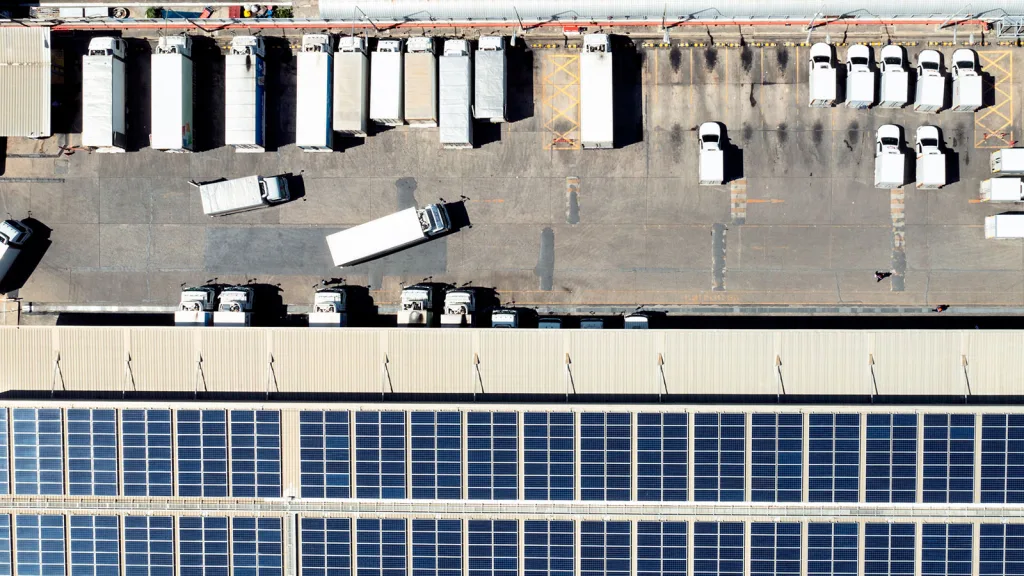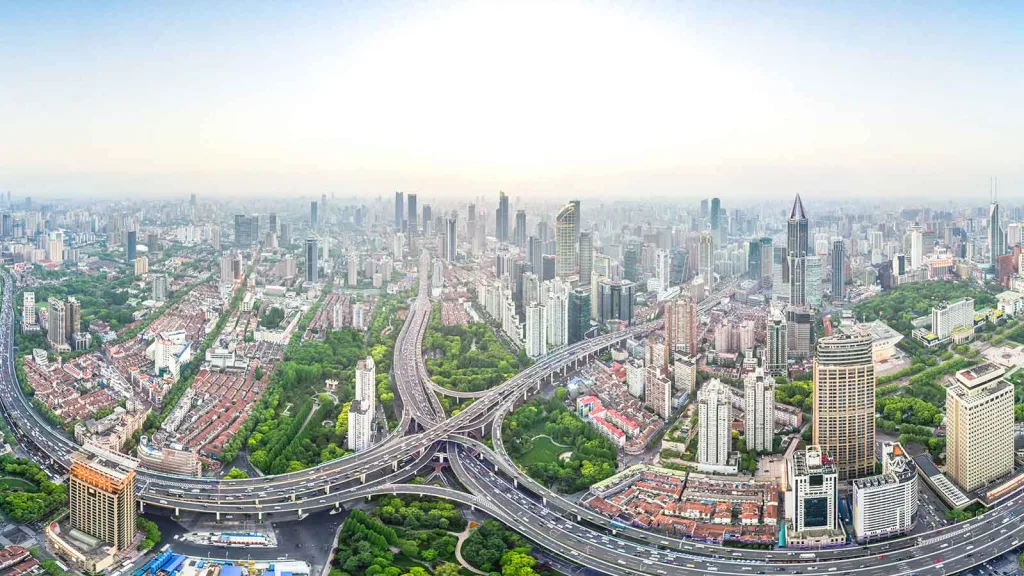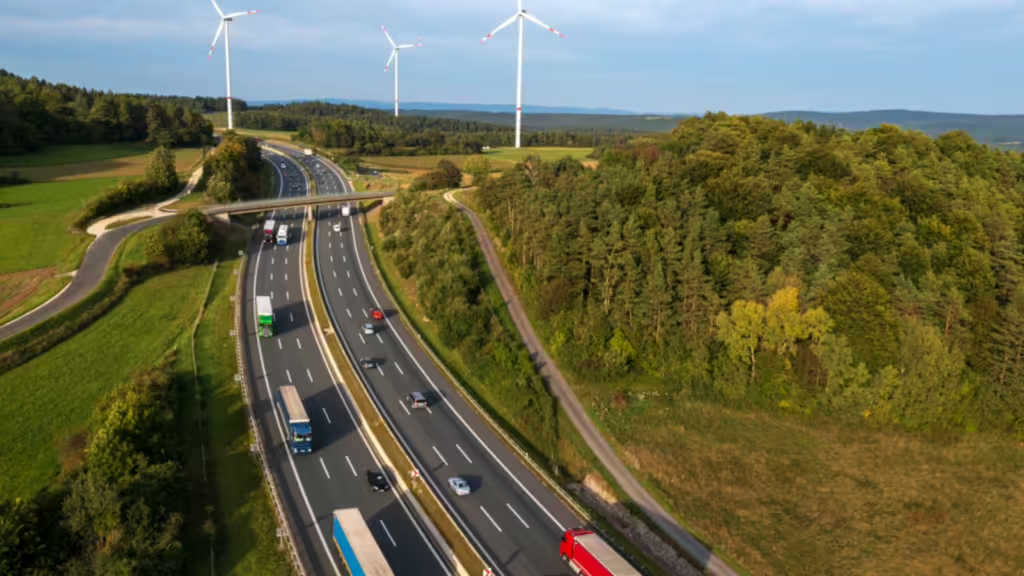As the world convenes in Brazil for COP30, WBCSD’s Transport & Mobility members highlight efforts to scale investments in transport decarbonization solutions across regions and vehicle segments and call for strengthened collaboration with governments and financiers to ensure a timely, resilient, and prosperous transition, including:
- Shaping new agreements and solutions to accelerate ZEV and infrastructure deployment, including 26,000+ heavy, medium and light electric vehicles and approximately 200 MW of renewable energy capacity in India, Mexico, and Brazil;
- Driving the business case for electrification use cases and supporting policy and standards integration in Europe;
- Co-design future mobility solutions with cities to ensure half of the world population has access to sustainable and people-centered and affordable solutions;
- Securing coherent policy frameworks, harmonized standards, and effective market-based mechanisms to accelerate transport decarbonization across modes, including the adoption of alternative fuels required in the maritime and aviation sectors.
Decarbonization is within reach, and businesses are showing the pathway
Transport is responsible for ~ 23 % of global energy‑related CO₂ emissions, making it one of the largest and fastest‑growing drivers of climate change. To align with the Paris Agreement, the sector must cut emissions by approximately 25 % by 2030.
To make this transition a reality, we need to address several use cases across transport modes and shape solutions that address specific market needs, while ensuring a just transition and protecting natural ecosystems.
This means deploying zero-emission vehicles supported by appropriate charging infrastructure, smart and flexible grids and digitalization to achieve seamless integration and operational efficiencies. Complementing electrification, Alternative Fuels like Hydrogen, Biofuels, and RNG are crucial to fill gaps where electrification falls short and ensure decarbonization of hard-to-abate sectors like shipping and aviation. This multi-use case and multi-technology landscape presents decarbonization challenges such as integration, fragmented planning and uncertain investments.
The good news is that the technologies are available, and businesses have been backing the transition with significant investments, showing that the transition is feasible and full of opportunities.
Clean transport remains one of the fastest growing areas of investment in the energy transition as EV adoption surges, more infrastructure is built, and shipping and aviation activity picks up.
– Colin McKerracher, Head of Clean Transport at BloombergNEF
According to WBCSD’s Business Breakthrough Barometer 2025, 91 % of business leaders say they have maintained or increased investments toward net-zero over the past year. This demonstrates both commitment and confidence in the available decarbonization technologies and digital solutions.
Governments and companies must collaborate across regions to bridge implementation and investment gaps
While global investment in electrified transport reached USD $757.4 billion in 2024 and the driving force behind growth in the global energy transition, investments are still insufficient to meet the scale and pace required for global transport decarbonization. The transport landscape remains fragmented and unpredictable, hampering scaled adoption and threatening global decarbonization goals.
Companies working towards decarbonization often face systemic challenges that slow down their progress. These include unclear transition roadmaps and varying market maturities, supply and demand gaps, diverse transportation and mobility needs, lack of integration in multi-fuel landscapes, and knowledge gaps.
Bridging these gaps requires collective action across the transport and mobility value chains and across regions, including:
- Clarifying technology breakthroughs that can rapidly scale and benefit climate, people, and nature, and strengthening the business case for their adoption by unlocking operational efficiencies and addressing risks.
- Removing roadblocks and aligning on standards and mechanisms that promote capital flow into clean transport.
- Driving regional action to foster ecosystem collaboration and enable tailored solutions design.
The road to sustainable mobility is about building better infrastructure, stronger partnerships, and a shared vision for the future of movement. At Toyota, we believe innovation thrives when businesses, governments, and communities work together to create mobility systems that are inclusive, efficient, and carbon neutral. Our goal is to help every journey contribute to a more sustainable world.
– Yumi Otsuka, Global Head of Sustainability, Toyota Motor Corporation
Businesses collaborate in emerging markets to scale Zero Emission Vehicle and charging infrastructure deployment
Since COP27, members of Zero Emission Vehicle Emerging Markets Initiative (ZEV-EMI), in partnership with ZEVTC and the Road Transport Breakthrough Agenda, have been shaping regional public-private partnerships to boost ZEV and infrastructure adoption, focusing on accelerating private investments and required policies in selected road corridors and urban areas.
As part of the regional efforts, they have been shaping new agreements and solutions to accelerate ZEV and infrastructure deployment, including 26,000+ heavy, medium and light electric vehicles and approximately 200 MW of renewable energy capacity in India, Mexico, and Brazil.
India partnership
As part of the India country partnership, established at COP27, companies are driving investments towards 8000 electric trucks and an equivalent of 1500 charge points and 78MW of Renewable energy sources by 2030. In 2025, they put forward an innovative leasing-led model designed to address the issue of segregated vehicle ownership by leveraging aggregated demand for clean transport and de-risking investments at scale. As limited charging infrastructure remains a key constraint, businesses guided the development of a national data-sharing platform . The platform enables evidence-based planning and targeted infrastructure investments thanks to the collection of fleet and operational data.
Fujitsu is proud to contribute to India’s ZEV-EMI initiatives, leveraging our offering called Software Defined Vehicle to optimize EV infrastructure. This data-driven approach has already achieved a 70% reduction in per-delivery charging time and 13% reduction in fuel costs for fleet operators. We believe national data-sharing platforms and innovative leasing models are crucial to overcoming infrastructure limitations and de-risking investments. Fujitsu will continue to apply its digital expertise to integrate mobility, energy, and urban planning data, accelerating the transformation towards a sustainable transport infrastructure.
– Sinead Kaiya, Corporate Executive Officer, EVP, Global Solutions Business Group (Strategic Planning), Fujitsu Limited
Mexico partnership
As part of the Mexico country partnership, established at COP28, companies are driving investments towards 17000 light and heavy-duty electric vehicles and an equivalent of 1350 charge points and 60 MW of Renewable energy sources by 2030.
At COP30, the collective action and investment alliance is now announcing efforts to (i) establish an e-truck pilot in Northern Mexico, aiming to deploy at least 15 electric trucks and build up to six megawatt-scale rapid charging hubs and (ii) address infrastructure and operational cost gaps to improve vehicle Total Cost of Ownership (TCO) and further scale adoption of light duty vehicles and charging infrastructure across Mexican cities. This follows a collaboration with Arcadis and TRATON to evaluate implementation and cost gaps, supported by the release of a TCO Evaluation Tool that helps companies better assess the business case for EV fleets.
The TCO tool for Mexico represents a major step forward in helping companies make data-driven investment decisions toward fleet electrification. By providing a clear, comparable view of context specific costs and benefits across technologies, we are supporting the Zero Emission Trucks transition.
– Greg Steele, Global President, Mobility, Arcadis
Mexico is a key focus market for our decarbonization roadmap. Through strong partnerships and innovative tools, we’re identifying viable pathways to accelerate the transition to low-emission transport and demonstrate that sustainability and business efficiency can go hand in hand.
– Jennifer Motles, Chief Sustainability Officer, Philip Morris International
The ZEV Mexico Partnership shows how ambition can be turned into implementation. By working together toward an e-truck pilot in northern Mexico and accelerating the scale-up of electric vehicles in urban centers, this coalition is demonstrating how collaboration and targeted efforts can drive real progress. These investments will not only reduce emissions but also unlock innovation and sustainable growth across Mexico’s transport sector. WBCSD will continue to help drive real progress and looks forward to working with members and partners to advance a zero-emission future.
– Diane Holdorf, Executive Vice President, World Business Council for Sustainable Development
Brazil partnership
As part of the Brazil country partnership, established at COP29, companies seek opportunities to scale investments in transport decarbonization. At COP30, in partnership with CALSTART, Smart Freight Centre, ICCT, WRI Brasil, Scania, Amazon and C40, they are announcing the e-Dutra coalition to transform Brazil’s mobility future.
The initiative has begun deploying electric trucks and chargers along the Rio de Janeiro–São Paulo corridor, with the intention to reach 1,000 trucks operating daily by 2030. By integrating lessons learned about vehicle performance, route optimization, and the practical requirements for large-scale commercial charging networks, e-Dutra is set to accelerate the rollout of reliable, high-capacity charging stations. Additionally, by aggregating large-scale commitments from shippers and logistics providers, the coalition creates a predictable demand signal which de-risks investments in charging infrastructure.
With our Brazilian brand Volkswagen Truck & Bus as a co-leader of the e-Dutra Coalition, TRATON is proud to work alongside our partners to transform Brazil’s road freight into a zero-emission future. By deploying electric trucks and developing the charging infrastructure along the Rio de Janeiro–São Paulo corridor, we are creating a scalable model that will accelerate the adoption of sustainable transport across the country.
– Andreas Follér, Chief Sustainability Officer, TRATON Group
As the battery revolution continues to unfold, electrifying road freight transport is a critical step in the energy transition of supply chains. But it requires collaboration across the entire ecosystem including private companies, regulators, and infrastructure providers. The Laneshift e-Dutra initiative shows how cross-sector cooperation can accelerate this transition and deliver tangible benefits to the communities along Brazil’s most important freight corridor.
– Morten Bo Christiansen, Head of Energy Transition, A.P. Moller – Maersk
The e-Dutra corridor is a landmark for sustainable freight and a powerful example of what collaboration can achieve. Decarbonizing transport is not only essential for the climate – it’s also a major driver of innovation, competitiveness, and growth. This coalition demonstrates how companies, government, and partners can turn ambition into action through investing in zero-emission trucks and charging infrastructure, through which Brazil is setting a new benchmark for climate leadership. WBCSD is looking forward to supporting the initiative and help accelerate the systemic transformation of transportation in Brazil and beyond.
– Diane Holdorf, Executive Vice President, WBCSD
Corporates strengthen efforts to scale ZEV and infrastructure deployment in Europe
At COP30, businesses are joining forces under the new ZEV European Coalition to drive regional dialogues and shape opportunities for scaling implementation and investments in ZEV & charging infrastructure deployment.
The European Commission-led Green Deal, Alternative Fuels Infrastructure Regulation (AFIR) and Clean Transport Corridor Initiative (CTCI) are driving crucial opportunities for accelerated investment and implementation in European green corridors.
The WBCSD ZEV European Coalition (ZEV EC) will seek to reinforce these efforts, targeting the deployment of tens of thousands of EV, charging units and Renewable Energy Sources across the region, and call for integrated and clear policies and standards that will drive electrification.
Businesses and cities come together to prepare for Future Urban Mobility
Urban mobility accounts for 40% of passenger’s global transport CO2 emissions, and passenger and freight demand are projected to double by 2050. Cities face mounting pressure to address three core challenges:
- how to reduce their ecological impact (reducing GHG emissions, air pollution and optimizing energy use);
- how to deliver inclusive, accessible mobility;
- how to make sustainable mobility attractive and economically viable for users and operators.
In 2025, WBCSD members continue to drive the co-design of the future mobility solutions that are sustainable, accessible, and collaborate with cities to shape affordable solutions. These dialogues will shape actionable roadmaps through 2026 and beyond.
Urban mobility is at the heart of a sustainable future. At Volkswagen Group, we are driving the transformation toward cleaner, smarter, and more connected mobility solutions, where every journey contributes to a better quality of life for all. By systematically developing our portfolio by fostering solutions like MOIA’s autonomous and shared mobility services, we’re turning this vision into reality—making sustainable, accessible transportation an everyday experience.
– Dirk Voeste, Chief Sustainability Officer, Volkswagen Group
Digitalization and AI will be essential to efficiently plan urban mobility systems, optimizing infrastructure and network investments, and allowing for operational efficiencies. Since 2019, mobility sector companies at WBCSD have developed value chain frameworks to scale sustainable mobility services, demonstrating how public-private collaboration based on data exchange can accelerate and optimize deploymentof charging infrastructure, drive more efficient and user-centric mobility, or enhance transport resilience.
Our multi-fuel bus pilot with Rybnik demonstrated how granular data-driven fuel optimization can strategically manage fuel mixes (Hydrogen and, ICE) to reduce GHG emissions while increasing resilience. This initiative, highlighting the power of digital collaboration and integrated transport systems for better investment decisions and urban mobility, offers crucial insights for logistics (HGV fleets) to achieve economically viable and environmentally responsible decarbonization.
– Sinead Kaiya, Corporate Executive Officer, EVP, Global Solutions Business Group (Strategic Planning), Fujitsu Limited
A timely transition cannot happen without global frameworks to scale low carbon fuels for maritime and aviation
Beyond road transport, the maritime, aviation, and rail sectors together account for around 25% of global transport emissions.
The “beyond road” sector faces complex challenges to decarbonize, including a lagging business case for alternative fuels, prohibitive prices, a lack of integration across value chains and regional roadmaps, and low standardization of recognized emissions accounting standards slowing demand for industry solutions.
The energy transition that the shipping industry is undertaking is challenging, yet the technology is ready with dual fuel vessels already operating. We see several technological and fuel pathways ahead, including liquified biomethane, biodiesel, and alcohols such as e- and bio-methanol where we have our largest offtake agreement starting production already next year. As with other transport sectors, the energy transition of shipping requires action and support from an entire ecosystem, including fuel producers, ship owners, regulators, and many more.
– Morten Bo Christiansen, Head of Energy Transition, A.P. Moller – Maersk
Scaling the maritime sector’s net-zero transition will demand USD $2.6 trillion by 2050, USD $2 trillion of which is for zero-emission fuel production. Meeting the International Civil Aviation Organization’s (ICAO) long-term aviation decarbonization goals will require approximately USD $3.2 trillion by 2050, with USD $19–45 billion alone needed by 2030 to scale sustainable aviation fuel production.
Companies in the maritime and aviation value chains have come together under a new Beyond road coalition at WBCSD to advocate for clear and integrated policy, standards and market-based mechanisms and accelerate the business case for decarbonization.
To engage with the WBCSD Transport & Mobility Decarbonization program, please contact Urska Skrt, Lead, Transport & Mobility (urska.skrt@wbcsd.org). For media inquiries, please reach out to media@wbcsd.org.
Outline
Related
Content

Unlocking Zero-Emission Vehicle Adoption: How Innovative Leasing Models Can Drive Market Creation
22 June, 2025

Collaborative pathways for building resilience in transport: insights from ITF 2025
5 June, 2025

22 businesses meet to stimulate investments in zero-emission freight corridors
30 September, 2024
